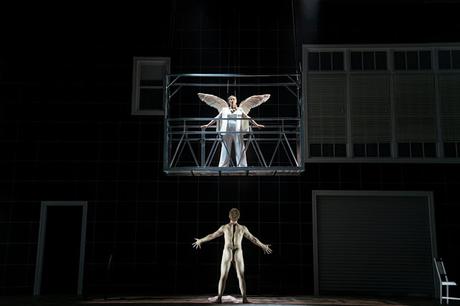by Paul J. Pelkonen[email protected]

All night angel wrestling match: Angels in America at New York City Opera.
Photo by Sarah Shatz for New York City Opera.
The gist if Angels carries over into Mr. Eötvös' opera, but the work falls short in many ways. The two parts of Angels: Millennium Approaches and Perestroika which together run seven and a half hours are condensed to 120 minutes, with Marie Mezei's libretto serving almost a Cliff Notes version of the original. Some characters are barely mentioned, others are discreetly cut. Much of the humor and a good deal of the emotional impact of Mr. Kushner's work is simply omitted, to its general detriment.
The eclectic, somewhat tuneless score (conducted by Pacien Mazzagatti) combines amplified singing, spoken dialog (retaining some of the wit of Mr. Kushner's text.) The character who suffers most is Prior Walter, played by Andrew Garland. He is an AIDS patient who becomes a (very) reluctant prophet when he is visited by a celestial messenger. The play's questions of social justice, gay visibility and standing up in the face of certain death remain and are present, but Prior is simply not as funny or sardonic as he is in the original work. Forced to play the hero as a stock operatic figure, Mr. Garland does his best.
That said, the crucial late night vision where Prior meets Harper Pitt (Sarah Beckham-Turner) in a shared dream remains and is one of the most effective sequences of the first half. This scene is a minor miracle, with slithery, otherworldly orchestration and some vamping from Mr. Garfield as he opens the mind of a Mormon housewife to the truth about gay men. In the austere, black-tiled world of this production, this is one of the few genuine moments of levity. Others are provided by the remarkable countertenor if Matthew Reese, who triples as the hallucinatory Mr. Lies, the sympathetic nurse Belize and a crazed Bronx bag lady.
Mr. Eötvös chose a kind of New York-inflected sprechstimme for Roy Cohn. Cohn (played by Wayne Tigges) is a a reprehensible figure, an oily character who combines the worst of the Captain from Berg's Wozzeck and Wagner's Mime. Ms. Beckham-Turner haunts Cohn as the ghost of Ethel Rosenberg, and her Hebrew lullaby to the dying man is the best part of the second act. However a key plot point of Perestroika involving Cohn's illegal stash of AZT (which saves Prior's life) is missing, a huge change from the ending of the original show.
Tenor Aaron Blake is surprisingly sympathetic as Lou, Prior's lover who ditches him following the revelation of illness. The heartbreak is real here, supported by both the orchestra and three hidden singers in the pit who lend their voices to the onstage characters when needed. That same night, the wayward Lou meets Joe, Harper's husband (Michael Weyandt.) He is a protege of Cohn's who is leaving his sham of a marriage. Their encounter replaces the scene where Lou leaves Prior in the hospital and goes off to pick up a prostitute in Central Park.
And then there's the Angel herself, sung robustly (and with unnecessary amplification) by Kirstten Chambers. Looking like a younger Karita Mattila, Ms. Chambers is a powerful presence. Her first vocal entry in Act One is powerful, her winged entry at the act's end less so. In Act Two, changes to the libretto diminish her impact. Although the scene in Heaven remains, the book that she gives Prior is not burnt, simply returned as if it were overdue from the heavenly branch of the New York Public Library.
The production, seen Monday night at the Rose Theater in Columbus Circle marks the start of a queer-friendly initiative by the reconstituted City Opera. Before the performance, general manager Michael Capasso addressed the audience, dedicating the performance to the memory of those lost in the 2016 PULSE nightclub massacre, and stating that Angels is the first in a planned series of LGBT-oriented operas, planned to coincide with Pride Month in seasons to come. The intent is noble, but let's hope that next year they pick a better opera.

